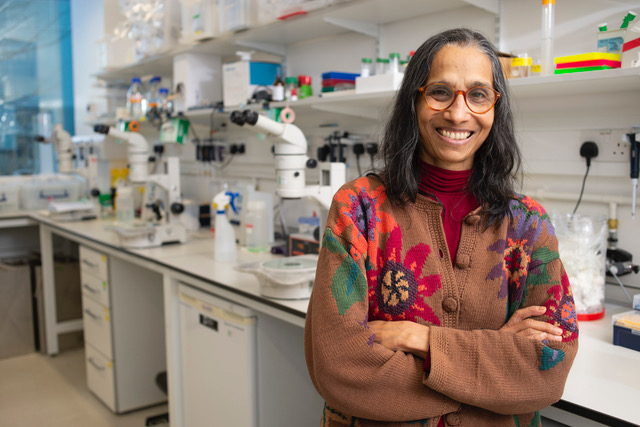
Lalita Ramakrishnan, Head of the University of Cambridge’s Molecular Immunity Unit, joins the LMB’s Cell Biology Division as a Group Leader. Lalita is a pioneer of research into the pathogenesis of tuberculosis (TB), a major infectious killer to this day. Lalita’s TB research has led her into diverse areas of cell and tissue biology, opening up opportunities for collaborative work in the Cell Biology Division. This approach of scientists with complementary expertise working together toward ambitious long-term goals underpins much of the research at the LMB.
Lalita’s work uses a zebrafish model to study how mycobacteria cause disease by evading and exploiting host processes. The zebrafish is a natural host to Mycobacterium marinum, a close relative of the human TB bacterium. The zebrafish is genetically tractable and optically transparent, which enables Lalita and her colleagues to manipulate and monitor infection in real-time. Their work has revealed the genetic basis of susceptibility to TB as well as the many ways in which mycobacteria manipulate host macrophages, their primary host niche. The use of the zebrafish has led to novel discoveries about TB that have immediate clinical implications in disease treatment.
After completing her medical training in India, Lalita went to the US to do a PhD in Immunology and medical residency training at Tufts Medical School in Boston. After completing a clinical Infectious Diseases Fellowship at the University of California, San Francisco, Lalita conducted postdoctoral research at Stanford. In 2001, Lalita joined the faculty of the University of Washington where she pioneered the zebrafish as a model for TB pathogenesis. In 2014, Lalita joined the University of Cambridge in the LMB’s Molecular Immunity Unit where she is Professor of Immunology and Infectious Diseases and Principal Research Fellow of the Wellcome Trust. Lalita has remained a practising Infectious Diseases Physician throughout her career. She has now resumed this role in the UK, working as an Infectious Diseases Consultant at Cambridge University Hospital. Lalita is a member of US National Academy of Sciences and EMBO, and a Fellow of The Royal Society, the Academy of Medical Sciences and the American Academy of Microbiology.
“Mycobacteria are exquisite cell biologists, having co-evolved with their hosts for millennia. I’ve enjoyed informal interactions with many [scientists] in Cell Biology for years and hope to collaborate more closely to understand the cell biology of TB. I also hope to lure my new colleagues into using the zebrafish by showing them it’s awesome power.” – Lalita
“I am thrilled to have Lalita join Cell Biology. We will undoubtedly benefit from her breadth of knowledge across many areas of physiology, infectious enthusiasm, and deep curiosity about every aspect of science.” – Manu Hegde, Joint Head of Division, Cell Biology
Further references
Lalita’s group page
New cell death pathway in tuberculosis indicates potential use of commonly used drugs